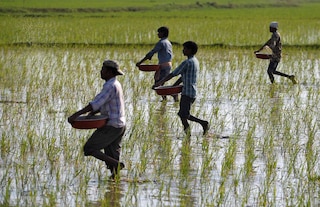India plans over $40 billion for food, fertiliser subsidy for 2022/23 – sources
New Delhi (Reuters) – India is likely to set aside about 3 trillion rupees ($40 billion) on food and fertiliser subsidies in its budget next week for 2022/23, officials said, roughly the same amount the government budgeted for this fiscal year ending in March.
India’s subsidy bills have spiralled due to pandemic relief measures for the poor and a sharp rise in global prices of chemicals. New Delhi has already raised fertiliser subsidies twice in this fiscal year, and sources said that its payouts for 2021/22 could be its highest yet.
In the budget Finance Minister Nirmala Sitharaman is due to present on Tuesday, the government will allocate 1.1 trillion rupees to fertiliser subsidies, and 2 trillion rupees to food subsidies, three officials told Reuters on condition of anonymity.
The fertiliser ministry had sought assistance of as much as 1.4 trillion rupees for 2022/23, another official said.
For the current fiscal year the finance ministry had budgeted 835 billion rupees for fertiliser subsidies, although the real allocation could rise to a record 1.5 trillion rupees.
The bulk of fertiliser subsidies are used to provide urea at a cheaper government-fixed rates to farmers. The government also provides a fixed amount of subsidy to companies for selling other fertilisers at lower rates to help farmer, a key vote bank.
For food subsidies, India had budgeted 2.43 trillion rupees in 2021/22 although the government later provided an additional 600 billion rupees.
India usually revises its budget for fertilisers and food subsidies upwards in the last few months of a fiscal year.
India’s finance, fertiliser and food ministries did not immediately reply to emails and messages seeking comments.
Global fertiliser prices have surged over 200% over the last 12 months after record rises in the price of the two main energy sources – coal and natural gas – used to produce the crop nutrients.
The 3 trillion rupee budget allocation for food and fertiliser subsidies is still higher than average in the seven years since Prime Minister Narendra Modi came to power, but far below what could be up to 4.8 trillion rupees that the government spent on the same this year.
In India subsidies form a tenth of the total annual expenditure planned for the year.
Prime Minister Narendra Modi has sought to meet his long term goal of reducing subsidies by tackling corruption and mismanagement. Any reduction in subsidies will affect a vast voter base of farmers that accounts for nearly 60% of the population.
Elections in the state of Uttar Pradesh, seen as a barometer for national elections due in 2024, along with leading grain producer Punjab and three other states will start on February 10.



